

El 84% de los contenidos consumidos en internet en España es pirata. UK government tightens up on collecting societies. Collecting Society Projects. Search. The CopyKat: Google appeal the Innocence of The Muslims decision, fearing ongoing ramifications. Lessig triumphs in fair use battle. European directive on collective rights management: Collecting societies must allow use of CC licenses. Paul Keller, November 26th, 2013 Today the JURI (legal affairs) committee of the European Parliament approved the compromise text of the proposed directive on collective rights management in the EU (478 KB PDF, passages in bold are changes from the original proposal).
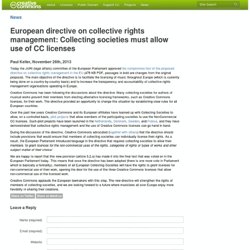
The main objective of the directive is to facilitate the licensing of music throughout Europe (which is currently being done on a country-by-country basis) and to increase the transparency and accountability of collective rights management organisations operating in Europe. Creative Commons has been following the discussions about the directive. Many collecting societies for authors of musical works prevent their members from electing alternative licensing frameworks, such as Creative Commons licenses, for their work. The directive provided an opportunity to change this situation by establishing clear rules for all European countries. Creative Commons applauds the European lawmakers with this step. Way forward to the Collective Rights Management Directive. As reported by the IPKat, a few days ago the Council formally adopted a new directive on “collective management of copyright related rights and multi-territorial licensing of rights in musical works for online uses in the internal market” [the 'CRM Directive'].
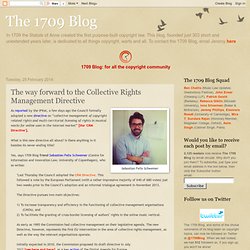
What is this new directive all about? Is there anything in it besides its never-ending title? Yes, says 1709 Blog friend Sebastian Felix Schwemer (Centre for Information and Innovation Law, University of Copenhagen), who so writes: "Last Thursday the Council adopted the CRM Directive. This followed a vote by the European Parliament (with a rather impressive majority of 640 of 680 votes) just two weeks prior to the Council’s adoption and an informal trialogue agreement in November 2013. Confirmed: Comcast and Netflix have signed a paid peering agreement. Comcast has agreed to a transit and interconnection agreement with Netflix, as Gigaom first reported on Friday afternoon.
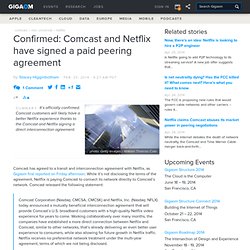
While it’s not disclosing the terms of the agreement, Netflix is paying Comcast to connect its network directly to Comcast’s network. Comcast released the following statement: News.ca Mobile. News.ca Mobile. The CopyKat - funny, but it's all about the money, honey. Search results for collecting societies. Following on from Jeremy’s post earlier, and now that the news that UK Government’s very positive response to Professor Ian Hargreaves' review of IP law is out is not really news at all, I thought I would add some detail to the Response which, as we now know, seemingly accepts all ten of Professor Hargreaves’ recommendations.
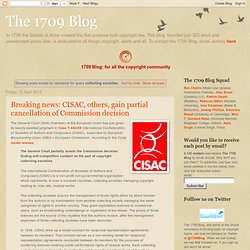
The Government say that their goal is to have measures in place by the end of this Parliament that will realise the Review’s vision and deliver real value to the UK economy, and to the creators and users of Intellectual Property saying “the Government announced plans to support economic growth by modernising UK intellectual property laws. Ministers have accepted the recommendations made in an independent review which estimate the potential to deliver up to £7.9 billion to the UK economy”.
"La nueva Ley de Propiedad Intelectual es fruto de la corrupción" 1º de todo, CEDRO no debería cobrar un impuesto / canon... básicamente porque SOLO LOS ESTAMENTOS PÚBLICOS son los únicos autorizados a cobrar impuestos.
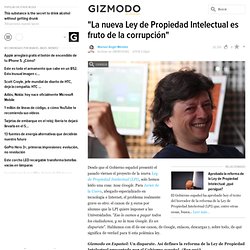
Vamos eso es lo que se dijo desde la UE con la SGAE considerando ilegal el Canon Digital, esto va por el mismo camino. La tasa Google que debería pagar Menéame. En la rueda de prensa del Consejo de Ministros del viernes 14 de febrero se presentó el proyecto de la nueva Ley de Propiedad Intelectual.

Dado el interés personal con este tema, la seguí en directo por TV. El empecinamiento de AEDE contra Internet. La AEDE, Asociación de Editores de Diarios Españoles, lanza la enésima fase de su campaña de intimidación afirmando que va a llevar a los tribunales a todos aquellos que se atrevan a utilizar sus contenidos en Internet, cargando especialmente las tintas en el caso de servicios como Google News, un tema del que ya hemos hablado en alguna otra ocasión.
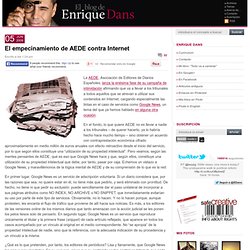
En el fondo, lo que quiere AEDE no es llevar a nadie a los tribunales – de querer hacerlo, ya lo habría hecho hace mucho tiempo – sino obtener un acuerdo con contraprestación económica cifrado aproximadamente en medio millón de euros anuales con efecto retroactivo desde el inicio del servicio, por lo que según ellos constituye una “utilización de su propiedad intelectual”. Pero veamos, según las mentes pensantes de AEDE, qué es eso que Google News hace y que, según ellos, constituye una utilización de su propiedad intelectual que debe, por tanto, pasar por caja. En primer lugar, Google News es un servicio de adscripción voluntaria. Lo que no se dijo en los Goya: los pagos de RTVE a la SGAE. Els agregadors de notícies hauran de compensar els editors.
TheStar. Canadians love Internet success stories such as Netflix and Google as recent data indicates that millions now subscribe to the online video service and Google is the undisputed leader in search and online advertising.

The changing marketplace may be a boon to consumers, but it also breeds calls for increased Internet regulation. That is particularly true in the content industry, with the film and music sectors recently calling for rules that would target online video services, Internet providers, and search engines. The Canadian Media Production Association, which represents independent producers of English films and television shows, recently told a Senate committee that new rules are needed to address the threat posed by popular Internet video services such as Netflix. The CMPA argued that a “level playing field” is needed to ensure that there is “choice, diversity and growth in a more open market place.” El misterioso caso de las películas que no se estrenan en España.
Philip Pullman: illegal downloading is 'moral squalor' Illegal downloading is a kind of "moral squalor" and theft as much as reaching in to someone's pocket and stealing their wallet is theft, the author Philip Pullman will say this week.
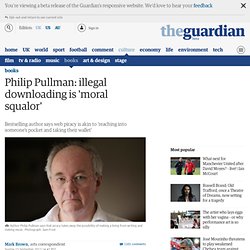
In an article for Index on Censorship, Pullman, who is president of the Society of Authors, makes a robust defence of copyright laws. He is withering about internet users who think it is OK to download music or books without paying for them. "The technical brilliance is so dazzling that people can't see the moral squalor of what they're doing," he writes. Record labels ask broadband providers to collect data on illegal downloads. Broadband providers are being asked to create a database of customers illegally downloading music, films and books, which could be used to disconnect or prosecute persistent offenders.
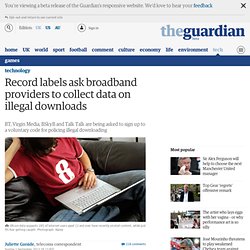
Measures to combat digital piracy will be among the topics discussed at a Downing Street breakfast on 12 September, when record-label bosses and their trade association, the BPI, have been invited to meet David Cameron. BT, Virgin Media, BSkyB and TalkTalk are being asked by music and film companies to sign up to a voluntary code for policing illegal downloading. Negotiations have been under way for months with the BPI and the British Video Association, whose members include the BBC and Hollywood studios. Between November 2012 and January this year, 280m music tracks were digitally pirated in the UK, along with 52m television shows, 29m films, 18m ebooks and 7m computer software or games files. A key part of any voluntary agreement is the creation of a database of repeat offenders.